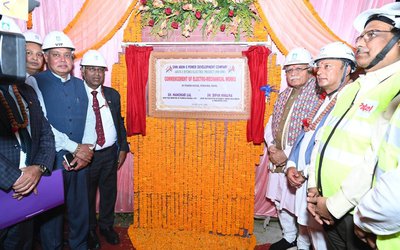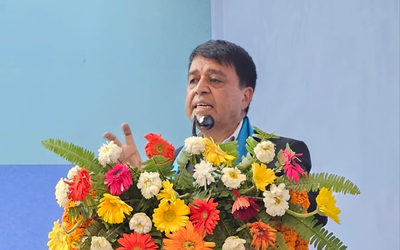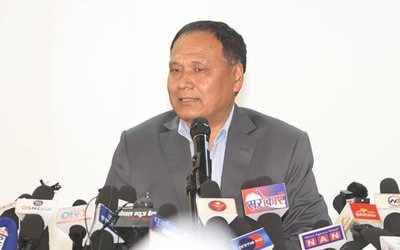
With the increase in the import of fossil fuels, Nepal’s foreign currency reserve is facing severe pressure. Thus, the government is pushing for the use of electricity as a substitute to reduce the imports of fossil fuels. In a process of the energy transition, Nepal’s four prominent organizations including two major universities and two major research foundations published Nepal Energy Outlook 2022.

Jointly prepared by Kathmandu University, Tribhuwan University Institute of Engineering, Niti Foundation and Nepal Energy Foundation, Nepal Energy Outlook 2022 was released today amid a function at the Center for Energy Studies, Institute of Engineering, and Pulchwok.
Gokarna Panthi, Joint secretary of Electricity Regulatory Commission, Mohan Das Manandhar, Niti executive director of Niti Foundation, Professor Dr. Tri Ratna Bajracharya, director of Center for Energy Studies (CES) IOM Tribhuwan University, Brajesh Adhikari, Professor of Kathmandu University and Sher Singh Bhat, Vice-president of Nepal Energy Foundation, jointly launched National Energy Outlook 2022 amid a program
Contributed by Dr. Nawaraj Sanjel, School of Engineering Kathmandu University, Dr. Anzoo Sharma, and Center for Energy Studies (CES), Institute of Engineering and Mohan Das Manandhar, Niti Foundation, The National Energy Outlook (NEO22) has analyzed the Nepali energy settings in three major contexts on sectorial status assessment, context and issue, strategies and prominent recommendation and the way forward.
The document has highlighted the shift of energy use patterns from traditional to modern energy with the significant increase in consumption of commercial fuel. According to a study, the consumption pattern of energy is shifting towards unsustainability.
The outlook also highlights the current deficiency and possibilities of the future surplus of hydroelectricity. Looking at the present global and national context, the outlook presented the energy security threat such as important dependence on commercial fuel with only four to five days of storage capacity.
At a time when concerned ministries of the Nepal Government have been announcing various steps to reduce the use of LPG by encouraging e-cooking, the outlook has spelled out the transition of cooking fuel from kerosene to LPG.
Moderated by Dilli Ghimire, Managing Director of Nepal Energy Foundation, government officials, energy experts and university professors have also contributed to raising the various issues pointed out by the report.
“One of the important issues discussed in the outlook is energy transition. From the perspective of our document does Nepal have options on the way to 2030 for the energy transition? This is an outlook and we use most of the data till 2021 and some data of 2022,” said Mohan Das Manandhar, executive director of Niti Foundation.
“We are in the process of detailing it and we will present Nepal’s energy transition by December. There are many important issues. However, I deal with only two major issues. By 2026, Nepal will graduate from the LDC. After graduation, Nepal will follow different economic modalities According to Nepal Vision Policy 2016; Nepal is expected to have an economy of 90 trillion. Our current economy is around 400 billion. However, the situation is different now with the effect of Covid-19. We are weakening. Our projection is 2500 dollars per capita and 900 billion economies projected. This need to have 9 to 10 percent growth.”
“The growth is possible due to local government. 90 percent of local levels have invested huge money in local infrastructures and access to houses. Local levels will invest huge money in economic infrastructures. The road is a major sector for inclusive economic growth. Our social and political gains are much higher compared to other countries. However, our economic gain is weaker,” said Manandhar.
“Nepal needs to have exported road. The local governments are now producing oriented by investing money in irrigation and water. The newly elected representatives have an interest in production. Volume-wise, the production is high. Local levels are supporting various production-related activities for high economic growth,” said Manandhar.
If the production sector grows, it will help to increase the demand for electricity. Local levels and other agencies will go to increase consumption. As the country focus on high production and economic growth, the consumption of energy will definitely increase. This is where we all need to look. This is a transition period for the energy market. With the rise in global prices, Nepal needs to shift its energy pattern from fossil fuel to clean energy. So far, there is a change this year in the budget.
Given the current state of economic growth, the demand site will increase and hydropower is meeting it. The current situation showed that Nepal will generate 10,000 MW by 2030. Our issue is how to use it.
“We need to explore other sources as well. We have been talking about hydropower. However, this is the time for transition. The first transition will be from fossil fuels to renewable and renewable. Types of energy hydropower, solar and wind,” said Manandhar.
By increasing the annual budget in the distribution and transmission sector, the country is right now in the energy transition. “With the announcement to replace LPG with electricity, the government has allocated around Rs.35 billion for the improvement of the distribution system. This is the heights budget. This is for the first time the government has increased the budget for transmission lines as well. Similarly, the government is allocating money to replace the current 5 umpire meter with 15. If this happens, cooking will move. This will start shifting the energy pattern. Local levels are also encouraging solar,” said Manandhar.
As Nepal has been importing a big volume of electricity to India this year, the outlook also looks at the Nepal-India electricity trade. The documents discuss the issues with a trade deficit, foreign exchange reserves and balance of payments situation with marginal surplus through export to India.’ “The current electricity trade with India is quite inspirational and can be expanded to minimize the existing balance of payments,” writes outlook.
“The outlook 2022 aims to show how alarming the overall energy scenario of the country with rising in the import of fossil fuel. We come out with recommendations to minimize the dependency on commercial fuel with available clean energy back home,” said Sher Singh Bhat, vice president of Nepal Energy Foundation.
As Nepal's fossil fuel import is rising, Nepal Oil Corporation is also searching for a way to reduce them. “The current rate of fossil fuel is unsustainable. I don’t think the country is in a position to pay foreign currency. We must think of an alternative to the current energy,” said Bharat Raj Regmi, Deputy Managing Director of NOC.

Dr. Nawaraj Sanjel, School of Engineering, Kathmandu University, contributor of the outlook, said that this shows a glimpse of the state of use of energy in Nepal and how the alarming increase of commercial fuel threatening the energy security of Nepal. He also highlighted the positive side of the beginning of the high volume of export of electricity to India.
Taking part in the discussion, former joint secretary of National Planning Commission Purushottam Ghimire said that the government has already revised the target of the use of LPG in its SDG goals.
Dr. Ram Prasad Dhital, energy expert and former executive director of Alternative Energy Promotion Center, the outlook rightly highlighted Nepal’s energy security scenario by analyzing various phenomena including the increased import of fossil fuels. These involve high risk in the current energy scenario.
Giving some models of replacing LPG by e-coking, Karuna Bajracharya, Clean Cooking Alliance, highlighted the successful model of replacing LPG with electric cooking in Kavre. “Our experiment has shown that replacing LPG with electric cooking is possible.”

Professor Jagnath Shrestha suggested the need to further explore energy options and add another phenomenon in the outlook. This need to be widely distributed to the public so that they can understand Nepal’s overall situation.
Gokarna Panthi, secretary of the Electricity Regulator Commission, said that there need to encourage more storage-type projects so that electricity supply can be made sustainable. “This outlook gives way to t move forward in the current energy transition.”
Closing the program, Professor Dr. Trirantna Bajracharya said that this is just an initial report. He said that it will be enlarged after consultations.
- KOICA Concludes Integrated Rural Development Project Worth 4.7 Million USD
- Apr 25, 2025
- Budget session Of Federal Parliament Begins Today
- Apr 25, 2025
- 10th Memorial Day Of Gorkha Earthquake
- Apr 25, 2025
- Kathmandu's Maximum Temperature Likely To Dip From Sunday
- Apr 25, 2025
- Budget Session Of Federal Parliament Commencing On Friday
- Apr 24, 2025















